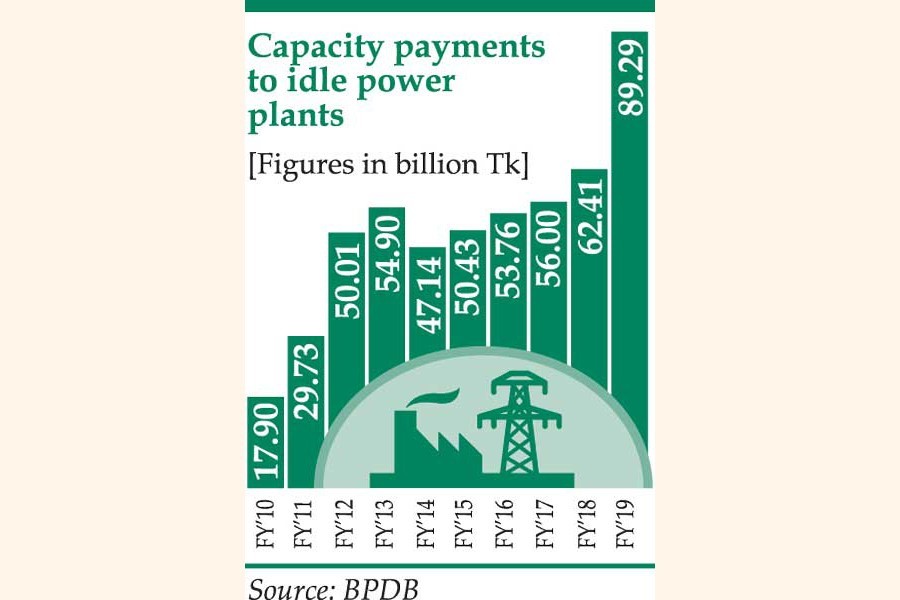Capacity payments up five times in nine years
Two-thirds to half of generation capacity remains idle

Published :
Updated :

Country's privately-owned power plants, especially the oil-fired ones, received a staggering Tk 89.29 billion in 'capacity payments' from the government in fiscal year (FY) 2018-19.
The plants got the fund without generating any electricity.
The capacity payments were 43 per cent up from that of FY '18. The Bangladesh Power Development Board (BPDB) that makes the payments to private power plants faced a revenue shortfall worth Tk 86.08-billion in FY '19.
The BPDB pays the owners under a contractual obligation as 'incentives' for keeping their plants idle.
The amount may go up further as more oil-fired power plants are expected to come on line soon, a senior BPDB official told the FE.
Energy experts and industry insiders deem it as the consequence of awarding 'more than required' expensive oil-fired power plants to the private sector.
According to the BPDB, the board had to pay around Tk 62.41 billion to privately-owned power-plant sponsors during FY '18 as capacity payment.
The payments were around Tk 56 billion during FY '17, Tk 53.76 billion in FY '16, Tk 50.43 billion in FY '15 and Tk 47.14 billion in FY '14.
The BPDB had to pay Tk 54.90 billion during FY '13, Tk 50.01 billion during FY '12, Tk 29.73 billion during FY '11 and Tk 17.90 billion during FY'10. Rental power plants were first allowed in the FY 2009-10
Capacity payment is a sort of penalty for BPDB that pays to plant owners if the government fails to buy a certain portion of power readily available with them.
As per power-purchase agreements, this penalty is calculated on the basis of around 40-per cent plant factor of the power plants, including the oil-fired rental and quick-rental power plant ones.
According to the BPDB statistics as of December 04 last, countrywide power generation during day peak hours was 6,876 megawatt (MW), which is only 35 per cent of total installed capacity of 19,570MW.
Electricity generation during evening peak hours on Wednesday was 8,708MW, which is 44.49 per cent of the total installed capacity.
The BPDB is keeping around one-third of overall power plants idle counting capacity charge for a lack of demand.
Brac University pro-vice chancellor Prof Mohammad Tamim accused a 'lobbyist group' of projecting an inflated electricity demand.
This resulted in the installation of power plants having more than required demand and soaring capacity payments, he said.
"But in reality electricity demand didn't increase significantly due to slow industrialisation," cited Mr Tamim, also a former special assistant to a caretaker government.
He said installation of more than required plants was the 'outgrowth' of a special law in 2010 for rapid development of the power and energy sector.
He suggested not to depend merely on political decision to implement such important decisions.
Professionals and stakeholders should be involved in the decision making process along with regular revision of the outcome of the decisions, he said.
Permanent shutdown of old and inefficient power plants is urgently required to reduce government losses, the energy expert observed.
Prof Ijaz Hossain of Bangladesh University of Engineering and Technology demanded a probe into the awarding of so many oil-fired plants to private sponsors without considering power consumption level.
The Consumers Association of Bangladesh (CAB) energy adviser Prof M Shamsul Alam alleged that a nexus between the BPDB and unscrupulous power entrepreneurs is capitalising on the 'loopholes' in the contracts.
It is simply leaving the government to count the inflated capacity payments cost, he said.
Mr Alam said some plants are failing to generate power in line with their commitment for lower plant factors due to outdated equipment and generators.
But they are shifting the blame for their failure onto the government to realise capacity payments, he alleged.
Mr Alam also demanded reconstitution of the state-run power entities' boards of directors to help make decisions efficiently avoiding 'conflict of interests'.
Officials said a drive was launched to install under the private sector multiple oil-fired rental and quick-rental plants from 2009, as a 'short-term' solution to a nagging countrywide electricity crisis.
Most of the plants were awarded based on unsolicited offers under the Speedy Supply of Power and Energy (Special Provision) Act 2010.
The law has a provision of immunity to those involved with a quick fix.
The government allowed entrepreneurs duty-free import of furnace oil to run plants with a 9.0-per cent service charge along with import costs as an incentive, said a senior power division official.
"We planned not to keep power generation capacity by 20-25 per cent higher than the demand," said a top BPDB official who was involved in power-sector policymaking during 2008-2009.
There was also a plan to timely retire rental and quick-rental plants, he said preferring anonymity.
"We were against building too many oil-fired plants," the official drudged, "but it was not executed later."
azizjst@yahoo.com


 For all latest news, follow The Financial Express Google News channel.
For all latest news, follow The Financial Express Google News channel.